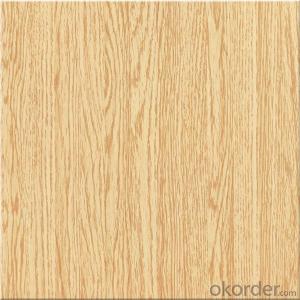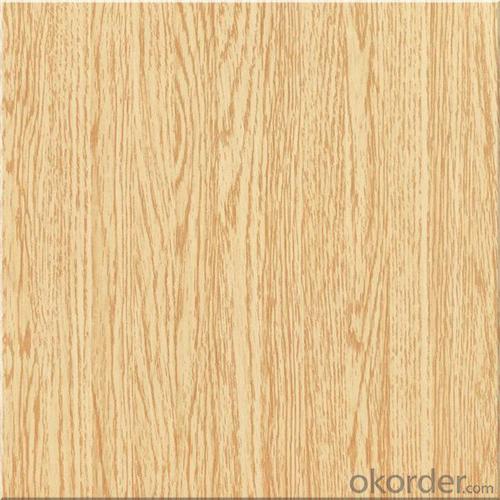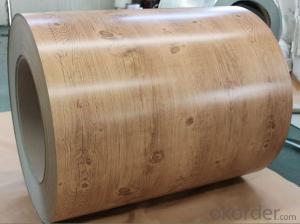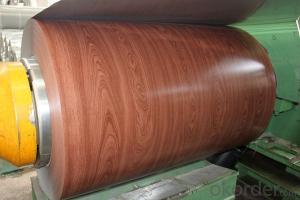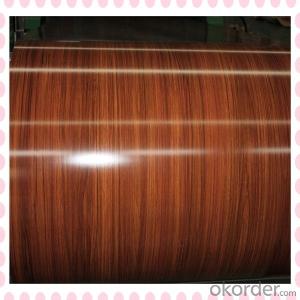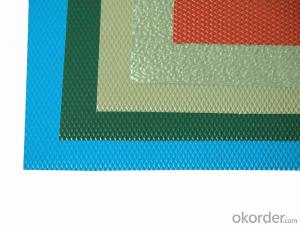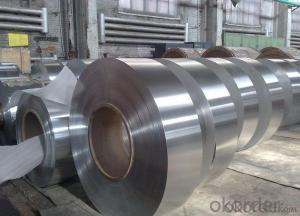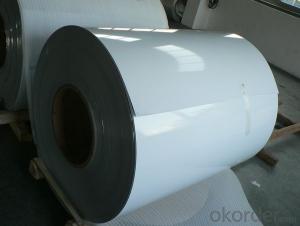032 Aluminum Coil Black - Wooden Surface Color Coated for Interior Wall System
- Loading Port:
- Shanghai
- Payment Terms:
- TT OR LC
- Min Order Qty:
- 5 m.t.
- Supply Capability:
- 10000 m.t./month
OKorder Service Pledge
OKorder Financial Service
You Might Also Like
Specification
1. Specification of Wooden Surface Color Coated Aluminum Coil for Interior Wall System
characteristics | Application |
1) Super peeling strength | 1) Building exterior curtain walls |
2) Excellent surface flatness and smoothness | 2) Decoration and renovation additions for old buildings |
3) Superior weather, corrosion, pollutant resistance | 3) Decoration of interior walls, ceilings, bathrooms, kitchens and balconies |
4) Even coating, various colors | 4) Shop door decorations |
5) Fireproof, excellent heat and sound insulation | 5) Advertisement board display platforms and signboards |
6) Superior impact resistance | 6) Wallboards and ceilings for tunnels |
7) Lightweight and easy to process | 7) Industrial materials, materials for vehicles and boats |
2. Application of Wooden Surface Color Coated Aluminum Coil for Interior Wall System
(1).Interior: wall cladding, ceilings, bathrooms, kitchens and balconies, shutters, doors...
(2).Exterior: wall cladding, facades, roofing, canopies, tunnels,column covers , renovations...
(3).Advertisement: display platforms, signboards, fascia, shop fronts...
3. Feature of Wooden Surface Color Coated Aluminum Coil for Interior Wall System
*Such coil is specially designed to replace aluminum ingot, due to the high export tax of aluminum ingot, the coil has better price than ingot.
*This type of coil can fit customer's remelting furnace just like ingot, no need to make any change to the production line that was previously used for ingot. The standard coil size and weight is very suitable for the feed gate of furnace.
*This type of coil causes less material wastage than ingot when remelted.
*Our coil is made directly from ore, no need to go though the ingot making process, quality is much better than other suppliers who use ingot scrap to make coil.
Be free from Oil Stain, Dent, Inclusion, Scratches, Stain, Oxide Dicoloration, Breaks, Corrosion, Roll Marks, Dirt Streaks and other defect which will interfere with use
4. Certificate:
SGS and ROHS(if client request, paid by client), MTC(plant provided), Certificate of Origin(FORM A, FORM E, CO), Bureau Veritas and SGS (if client request, paid by client), CIQS certificate
5. Image of Wooden Surface Color Coated Aluminum Coil for Interior Wall System
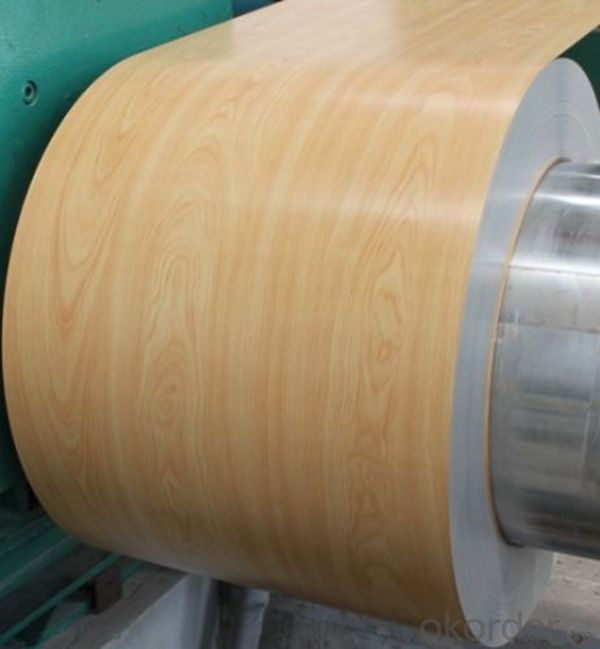
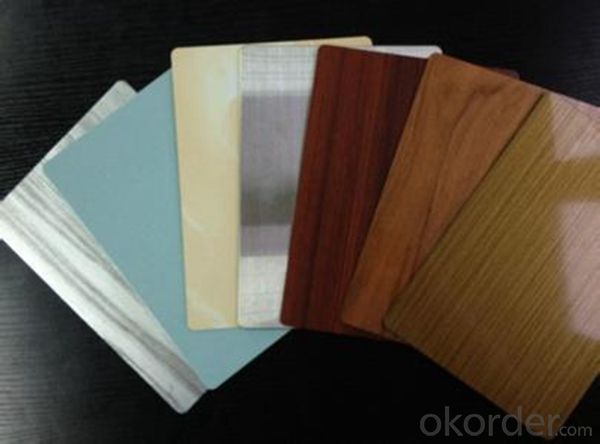
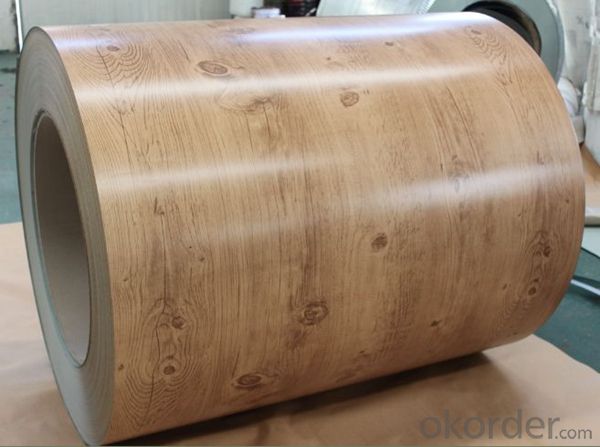
6. Package and shipping of Wooden Surface Color Coated Aluminum Coil for Interior Wall System
eye to wall
eye to the wall
with wood pallet (wooded case also available)
7. FAQ
1) What is the delivery time?
Dpends on actual order, around 20 to 35 days
2)What is the QC system:
We have QC staff of 20 persons and advanced equipment, each production is with MTC traced from Aluminum ingot lot.
3) What market do you mainly sell to?
Australia, America, Asia, Middle East, Western Europe, Africa etc
- Q: How are aluminum coils joined together to form larger panels?
- Aluminum coils are joined together to form larger panels through a process called coil coating or coil joining. In this process, the edges of the coils are aligned and then welded, soldered, or bonded together using specialized techniques and adhesives. This ensures a strong and seamless connection between the coils, resulting in a larger aluminum panel.
- Q: I am wondering if a deodorant made with aluminum silicate is safer than one with aluminum salt.
- aluminum silicates have been used in deodorants for years. there was a time when it was thought that the Al in the deodorants was causing alzheimers but that has been shown to be wrong. if there are other dangers to the silicates, we haven't found them or they aren't that bad
- Q: Can aluminum coils be painted or coated after installation?
- After installation, it is indeed possible to paint or coat aluminum coils. Aluminum, being a versatile material, lends itself well to painting or coating in order to improve its aesthetics or offer extra safeguarding. Opting to paint or coat aluminum coils subsequent to installation can effectively thwart corrosion, enhance durability, and yield a personalized finish. The selection of paint or coating hinges upon the specific necessities and desired results. Prior to applying any paint or coating, it is crucial to thoroughly clean and prepare the aluminum surface to ensure strong adhesion and long-lasting results.
- Q: What is the difference between aluminum coils and aluminum sheets?
- Aluminum coils and aluminum sheets are both made from the same material, which is aluminum. However, there are some key differences between the two. One major difference is their form and shape. Aluminum coils are typically long, continuous pieces of aluminum that are wound into a coil shape. They are often used in industries such as construction, automotive, and HVAC for applications such as roofing, insulation, and air conditioning systems. On the other hand, aluminum sheets are flat pieces of aluminum that come in various sizes and thicknesses. They are commonly used in industries like aerospace, transportation, and packaging for applications such as aircraft parts, automotive body panels, and food packaging. Another difference is their manufacturing process. Aluminum coils are produced by a process called continuous casting, where molten aluminum is continuously poured into a mold and then cooled and solidified into a coil shape. This process allows for the production of long, continuous coils. Aluminum sheets, on the other hand, are typically produced through a rolling process. The aluminum is passed through a series of rollers that progressively reduce its thickness until the desired sheet thickness is achieved. This process allows for the production of flat sheets with specific thicknesses. Furthermore, the uses and applications of aluminum coils and sheets also differ. Due to their coil shape, aluminum coils are commonly used in applications that require long continuous lengths, such as roofing or HVAC systems. Aluminum sheets, with their flat shape, are often used in applications where a flat surface is needed, such as in the manufacturing of panels or components. In summary, the main difference between aluminum coils and aluminum sheets lies in their form, manufacturing process, and applications. Coils are long, continuous pieces of aluminum produced through continuous casting, while sheets are flat pieces produced through rolling. The choice between coils and sheets depends on the specific requirements of the application.
- Q: This question asks about the potential health impacts of aluminum coils, which are commonly used in various industries and products.
- <p>Aluminum coils themselves are generally considered safe and do not directly affect health when used in their typical applications such as construction, electrical components, or food packaging. However, there is ongoing debate about the potential health risks of aluminum exposure, particularly when ingested. Some studies suggest a link between aluminum and neurological disorders like Alzheimer's disease, though this is not conclusively proven. It's important to note that aluminum is a common element found naturally in the environment, and the human body can naturally excrete small amounts. The use of aluminum coils in food packaging is regulated to ensure safety, and the risk of aluminum toxicity from these sources is considered low.</p>
- Q: Can a digital caliper be utilized to accurately measure the diameter of an aluminum coil?
- <p>Yes, you can use a digital caliper to measure the diameter of an aluminum coil accurately. Digital calipers are precise measuring tools, often accurate to 0.001 inches or 0.02mm, which is suitable for measuring the diameter of various objects, including aluminum coils. Ensure the caliper is zeroed before use and that the coil's surface is clean and flat where the measurement is taken to get accurate readings.</p>
- Q: Are aluminum coils suitable for gutter systems?
- Yes, aluminum coils are suitable for gutter systems. Aluminum is a popular choice for gutter systems due to its durability, lightweight nature, and resistance to rust and corrosion. It is a cost-effective option that can withstand harsh weather conditions and has a long lifespan. Additionally, aluminum coils are easy to install and maintain, making them an ideal choice for gutter systems.
- Q: How do aluminum coils compare to other materials in terms of strength?
- Aluminum coils are known for their excellent strength-to-weight ratio, making them highly competitive compared to other materials. While materials like steel or copper may have higher absolute strength, aluminum coils offer comparable strength with significantly lighter weight, making them ideal for various applications where weight reduction is crucial.
- Q: Describe the process of rolling aluminum coil in a few sentences.
- <p>The process of rolling aluminum coil involves several key steps. Initially, aluminum ingots are heated to a specific temperature to make them pliable. Then, they are passed through a series of rolling mills where the ingots are pressed and shaped into thin sheets or coils. This process reduces the thickness and increases the length and width of the material. During rolling, the aluminum may be annealed to improve its ductility and strength. After rolling, the aluminum coil is cooled, cleaned, and inspected for quality. The final step includes coiling the rolled aluminum into manageable rolls for storage and transportation. This process is critical for producing aluminum coils used in various industries such as construction, automotive, and packaging.</p>
- Q: What is the difference between aluminum plate and aluminum coil?
- A sheet is flat, one by one for storage, one for coil material, one roll for storage, but aluminum coil can be leveled by machine, that is aluminum plate.
Send your message to us
032 Aluminum Coil Black - Wooden Surface Color Coated for Interior Wall System
- Loading Port:
- Shanghai
- Payment Terms:
- TT OR LC
- Min Order Qty:
- 5 m.t.
- Supply Capability:
- 10000 m.t./month
OKorder Service Pledge
OKorder Financial Service
Similar products
Hot products
Hot Searches
Related keywords
